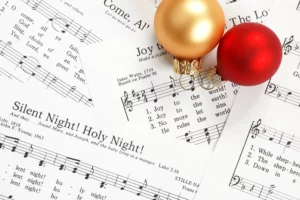Celebration is at the heart of the way of Christ. He entered the world on a high note of jubilation: “I bring you good news of a great joy,” cried the angel, “which shall come to all the people” (Luke 2:10). He left the world bequeathing His joy to the disciples: “These things I have spoken to you that my joy may be in you, and that your joy may be full” (John 15:11).
The Spirit of Carefree Celebration
The apostle Paul calls us to “rejoice in the Lord always; again I will say, Rejoice” (Philippians 4:4). But how are we to do that? “Have no anxiety about anything,” or as the King James Version puts it, “Be careful for nothing.” That is the negative side of rejoicing. The positive side is “in everything by prayer and supplication with thanksgiving let your requests be made known to God.” And the result? “The peace of God, which passes all understanding, will keep your hearts and minds in Christ Jesus” (Philippians 4:6-7).
Paul instructed us on how we can always rejoice, and his first word of counsel was to be “full of care” for nothing. Jesus, of course, gave the same advice when He said, “Do not be anxious about your life, what you shall eat or what you shall drink, nor about your body, what you shall put on” (Matthew 6:25). In both instances the same word is used, which we translate “anxious” or “careful.” Christians are called to be free of care, but we find such a way foreign to us. We have been trained since we were two years old to be full of care. We shout to our children, as they run to the school bus, “Be careful,” i.e., be full of care.
The spirit of celebration will not be in us until we have learned to be “careful for nothing.” And we will never have a carefree indifference to things until we totally trust God. This is why the Jubilee was such a crucial celebration in the Old Testament. No one would dare celebrate the Jubilee unless they had a deep trust in God’s ability to provide for their needs.
When we trust God we are free to rely entirely upon Him to get what we need: “By prayer and supplication with thanksgiving let your requests be made known to God.” Prayer is the means by which we move the arm of God. Hence we can live in a spirit of carefree celebration.
Paul, however, did not end the matter there. He proceeded to tell us to set our minds on all the things in life that are true, honorable just, pure, lovely and gracious. God has established a created order full of excellent and good things, and it follows naturally that if we think on those things we will be happy. That is God’s appointed way to joy. If we think we will have joy only by praying and singing psalms we will be disillusioned. But if we fill our lives with simple good things and constantly thank God for them, we will know joy. And what about our problems? When we determine to dwell on the good and excellent things in life, our lives will be so full of those things that they will tend to swallow our problems.
The decision to set the mind on the higher things of life is an act of the will. That is why celebration is a discipline. It is not something that falls on our head. It is the result of a consciously chosen way of thinking and living. As we choose that way, the healing and redemption in Christ will break into the inner recesses of our lives and relationships, and the inevitable result will be joy.
The Benefits of Celebration
Far and away the most important benefit of celebration is that it saves us from taking ourselves too seriously. That is a desperately needed grace for all those who are earnest about the Spiritual Disciplines. It is an occupational hazard of devout folk to become stuffy bores. That should not be. Of all people we should be the most free, alive, interesting. Celebration adds a note of gaiety, festivity, hilarity to our lives. After all, Jesus rejoiced so fully in life that He was accused of being a winebibber and a glutton. Many of us lead such sour lives that we couldn’t possibly be accused of such things.
Now I am not recommending a periodic romp in sin, but I am suggesting that we do need deeper, more earthly experiences of exhilaration. It is healing and refreshing to cultivate a wide appreciation for life. Our spirit can become weary with straining after God, as our body can become weary with overwork. Celebration helps us to relax and enjoy the good things of the earth.
Celebration can be an effective antidote for the periodic sense of sadness that can constrict and oppress the heart. Francois Fenelon in his chapter titled “Helps in Sadness” counseled those who were bowed low with the burdens of life to encourage themselves “with good conversation, even by making merry.”Francois Fenelon, Christian Perfection (Minneapolis: Bethany Fellowship Inc., 1975), 102.
Celebration gives us perspective. We can laugh at ourselves. We come to see that the causes we champion are not nearly so monumental as we would like to believe.
In celebration the high and the mighty regain their balance and the weak and lowly receive new stature. Who can be high or low at the festival of God? Together the rich and the poor, the powerful and powerless all celebrate the glory and wonder of God. There is no leveler of caste systems like festivity.
Thus freed of an inflated view of our own importance we are also freed of a judgmental spirit. Others do not look so awful, so unspiritual. Common joys can be shared without subjecting them to sanctimonious value judgments.
Finally, an interesting characteristic of celebration is that it tends toward more celebration. Joy begets joy. Laughter begets laughter. It is one of those few things in life that by giving we multiply. Kierkegaard said, “humor is always a concealed pair.”D. Elton Trueblood, The Humor of Christ (New York: Harper & Row, 1964), p. 33.
The Practice of Celebration
If celebration is primarily a corporate Discipline, and if it brings such benefit to the people of God, how is it practiced? The question is a good one, for modern men and women have become so mechanized that we have snuffed out nearly all experiences of spontaneous joy. Our experiences of celebration are artificial, plastic.
Because of the goodness of God the heart breaks forth into psalms and hymns and spiritual songs. Worship, praise, adoration, dancing, laughing, flow from the inner chambers. The psalmist declared, “The earth is the Lord’s and the fullness thereof” (Psalm 24:1). In Psalm 150 we see the celebration of the people of God with trumpet and lute and harp, with timbrel and dance, with strings and pipe and loud clashing cymbals.
What do little children do when they celebrate? They make noise, lots of noise. There is not a thing wrong with noise at the appropriate time, just as there is nothing wrong with silence when it is appropriate. Children dance when they celebrate. David went leaping and dancing before the Lord with all his might (2 Samuel 6:14-16). When the children of Israel had been snatched from the clutches of Pharaoh by the mighty power of God, Miriam the prophetess led the people in a great celebration dance (Exodus 15:20). The folk dance has always been a carrier of cultural values and has been used repeatedly in genuine celebration. Of course dancing can have wrong and evil manifestations, but that is another matter entirely.
Dancing and noise making are not required forms of celebration. They are examples only, to impress upon us that the earth indeed is the Lord’s and the fullness thereof. Like Peter we need to learn that nothing is unclean that comes from the gracious hand of God (Acts 10). We are free to celebrate the goodness of God with all our viscera!
We can do some specific things to cultivate the art of celebration. One is to accent the creative gifts of fantasy and imagination. Harvey Cox has observed that “man’s celebrative and imaginative faculties have atrophied.”Harvey Cox, The Feast of Fools (Cambridge: Harvard University Press, 1969), p. 11. In another place he writes, “There was a time when visionaries were canonized, and mystics were admired. Now they are studied, smiled at, perhaps even committed. All in all, fantasy is viewed with distrust in our time.”Ibid., p. 10.
We who follow Christ can risk going against the tide. Let us with abandon relish the fantasy games of children. Let’s see visions and dream dreams. Let’s play, sing, laugh. The imagination can release a flood of creative ideas, and exercising our imagination can be lots of fun. Only those who are insecure about their own maturity will fear such a delightful form of celebration.
Another thing we can do is to make family events into times of celebration and thanksgiving. This is particularly true of the various rites of passage in our culture like birthdays and graduations. But it should also be true of lesser but equally important events. Why allow Halloween to be a pagan holiday in commemoration of the powers of darkness? Fill the house or church with light; sing and celebrate the victory of Christ over darkness. Let the children (and adults) dress up as biblical characters or as some of the saints through the centuries. In addition, form regular rituals of celebration that are not connected with historic events but that belong to your family alone. Spend more time around the piano as a family and sing out! Learn the folk dances of various cultures and enjoy them together.
A third thing we can do is to take advantage of the festivals of our culture and really celebrate. Christmas may be a lost cause but Easter certainly is not. Forget the spring style show and celebrate the power of the resurrection. Make family Easter plays. Revive the May Day celebrations. Go pick flowers and deliver them to your neighbors and friends. Rejoice in the beauty of color and variety.
In the Middle Ages there was a holiday known as the Feast of Fools.Ibid., p. 3. It was a time when all “sacred cows” of the day could be safely laughed at and mocked. Minor clerics mimicked and ridiculed their superiors. Political leaders were lampooned. We can do without the excessive debauchery that often accompanied those festivities, but we do need an occasion to laugh at ourselves. Instead of chafing under and fighting against the social customs of our day we might do well to find ways to laugh at them.
We are not limited to established festivals; we can develop our own. Recently our church fellowship had a celebration night in appreciation of the pastors. Each family designed a homemade card. Various groups prepared skits, plays, readings, jokes. As one of those pastors, I can say that it was a hilarious night.
Celebration gives us the strength to live in all the other Disciplines. The other Disciplines faithfully pursued bring us deliverance from those things that have made our lives miserable for years, which in turn evokes increased celebration. Thus is formed an unbroken circle of life and power.
Copyright 1978 Richard Foster. All rights reserved. Reprinted with permission.










